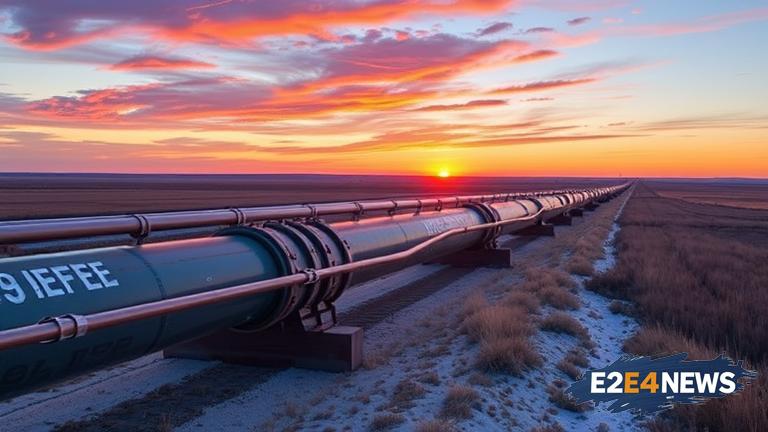A group of energy CEOs recently made a case to North Dakota officials for a $500 million financial backstop to support the construction of a new gas pipeline in the state. The proposed pipeline, which would transport natural gas from the Bakken formation to markets in the eastern United States, is expected to create hundreds of jobs and generate significant economic benefits for the region. The energy CEOs argued that the financial backstop is necessary to mitigate the risks associated with the project and to ensure its completion. They pointed out that the pipeline would not only create jobs during the construction phase but also provide a long-term source of revenue for the state through taxes and royalties. The officials were told that the pipeline would have a significant impact on the local economy, with estimates suggesting that it could generate up to $100 million in annual taxes and royalties. The energy CEOs also emphasized the importance of the pipeline in terms of energy security, noting that it would help to reduce the state’s reliance on imported fuel and provide a cleaner-burning alternative to coal and other fossil fuels. However, some officials expressed concerns about the potential environmental impacts of the pipeline, including the risk of accidents and the effects on local wildlife habitats. The energy CEOs acknowledged these concerns and pledged to work with regulators and local communities to minimize the pipeline’s environmental footprint. They also pointed out that the pipeline would be designed and built with state-of-the-art safety features, including advanced leak detection systems and emergency shutdown valves. Despite these assurances, some officials remained skeptical about the need for a $500 million financial backstop, arguing that it could be a burden on taxpayers if the project were to fail. The energy CEOs countered that the financial backstop would be repaid through a combination of private investment and revenue generated by the pipeline, and that it would not pose a significant risk to the state’s finances. The officials were also told that the pipeline would be subject to rigorous regulatory oversight, including environmental impact assessments and public hearings. The energy CEOs emphasized that they were committed to transparency and accountability throughout the project’s development and operation. They also highlighted the potential benefits of the pipeline for local communities, including the creation of new jobs and business opportunities. The officials were informed that the pipeline would be designed to accommodate future growth and expansion, with the potential to transport other types of energy products, such as crude oil and natural gas liquids. The energy CEOs concluded their presentation by emphasizing the importance of the pipeline for North Dakota’s economic future, and by urging officials to support the project. The officials are expected to make a decision on the financial backstop in the coming weeks, after considering the energy CEOs’ proposal and weighing the potential benefits and risks of the project. The pipeline has been the subject of intense debate in recent months, with some arguing that it is essential for the state’s economic development, while others have raised concerns about its environmental impacts. The energy CEOs’ proposal has added a new layer of complexity to the debate, with some officials expressing support for the financial backstop, while others have expressed skepticism. The outcome of the decision is likely to have significant implications for the state’s energy industry, as well as for local communities and the environment. The energy CEOs’ proposal has also sparked a wider debate about the role of government in supporting large-scale energy infrastructure projects, with some arguing that it is essential for economic development, while others have raised concerns about the potential risks and costs. The pipeline is expected to be a major topic of discussion in the state’s upcoming legislative session, with lawmakers likely to consider a range of bills related to energy development and environmental regulation. The energy CEOs’ proposal has also highlighted the need for greater transparency and accountability in the development and operation of large-scale energy infrastructure projects, with some arguing that it is essential for building public trust and ensuring that the benefits of the project are shared fairly. The officials’ decision on the financial backstop is likely to be closely watched by industry observers, environmental groups, and local communities, who will be eager to see how the project unfolds and what its impacts will be on the state’s economy and environment.
